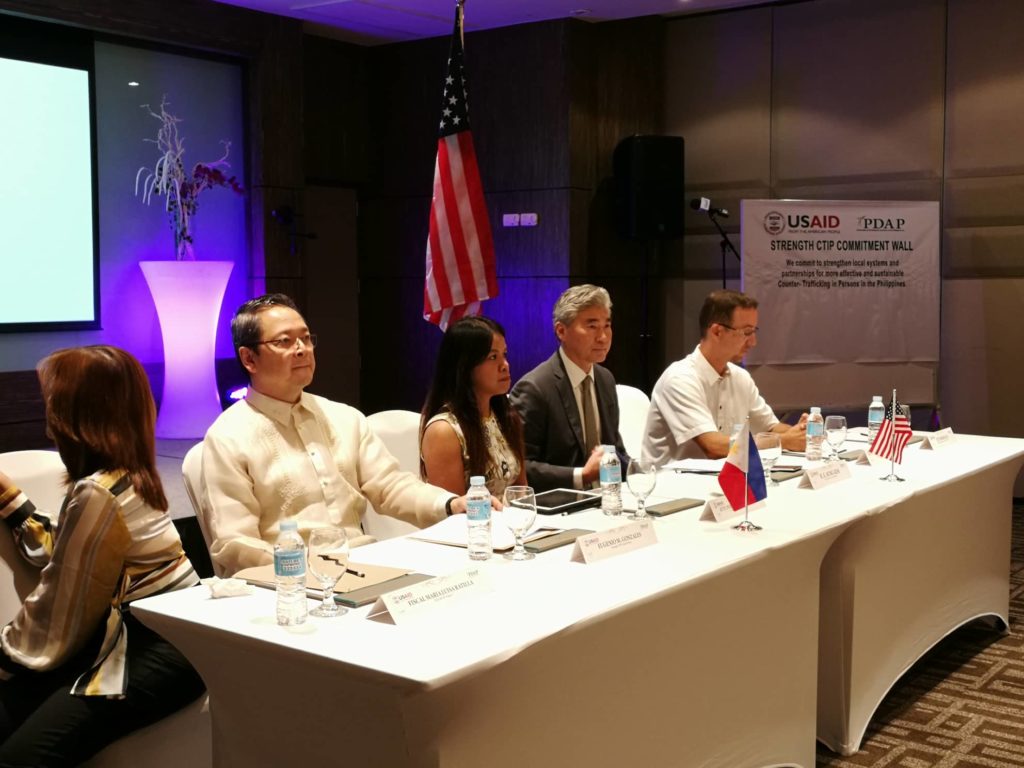IACAT seeks higher conviction rate for sex traffickers

Members of IACAT, USAID, and US Ambassador to the Philippines Sung Yong Kim during the launching of the Strength CITP at bai Hotel in Mandaue City, Cebu | CDN Digital Photo by Morexette Marie B. Erram
CEBU CITY, Philippines – The Department of Justice (DOJ) announced that they recorded an increase in convictions related to human trafficking in the country from 2018 to 2019.
Lawyer Yvette Coronel, deputy executive director of the Interagency Council Against Trafficking (IACAT), disclosed this in her speech today Monday, January 27 during the ceremonial launching of the Strength Counter-trafficking in Persons (CTIP).
The event, held in bai Hotel in Mandaue City, Cebu, was also attended by United States Ambassador to the Philippines, Sung Yong Kim.
Strength CTIP is a US$3 million (roughly P150 million) project by the U.S. Agency for International Aid (USAID) designed to reinforce and provide more means to eradicate human trafficking in the Philippines.
Coronel said their committee observed an increase in the number of convictions related to trafficking in persons (TIP) from 2017 to 2018.
“In 2018, the Philippines attained the highest number of convictions on TIP cases at 119, convicting 95 perpetrators. This shows a 95% increase compared to the previous year. Moreover, 80% of the successfully prosecuted TIP cases involved minor victims,” she said.
Coronel also revealed that as of December 2019, the country has 512 TIP convictions against 523 suspects.
“As of December 2019, the Philippines has recorded 512 TIP convictions against 523 persons convicted, giving justice to 1,191 trafficked victims, 686 (57%) of whom are minors,” she added.
However, the IACAT official disclosed that more work needs to be done when convicting suspects of cases related to sex trafficking.
“While these are no doubt good numbers in general, the Philippine numbers in terms of labor trafficking convictions, same with the global trends/statistics, unfortunately, lag behind sex trafficking convictions. Thus, we recognize that more efforts need to be put towards this, through intensified trainings of frontliners and first responders which will result in better victim identification,” said Coronel.
USAID and the Partnership for Development Assistance to the Philippines (PDAP), the lead implementing agency of Strength CTIP, signed a memorandum of understanding (MOU) to mark the agreement.
While congratulating the Philippines for maintaining a Tier 1 classification in the United States’ TIP annual report for four consecutive years, Kim, as the keynote speaker for the event, also encouraged members of the private sector in the country to explore more ways in combatting human trafficking.
“Private businesses are now, more than ever, engaged in the fight against human trafficking. Some are looking at business processes and supply chains, and going beyond corporate social responsibility to ensure they are doing all they can to prevent and address trafficking,” Kim said.
“I encourage our business partners here today to take a look and find ways to prevent your supply chains from indirectly supporting traffickers. Strong partnerships among stakeholders are critical to achieve results in the areas of protection, prosecution and prevention. I have confidence in these powerful forces that work together to protect and save lives,” he added.
TIP report is an annual publication by the United States government that ranks governments worldwide on their efforts to combat human trafficking. /rcg
Disclaimer: The comments uploaded on this site do not necessarily represent or reflect the views of management and owner of Cebudailynews. We reserve the right to exclude comments that we deem to be inconsistent with our editorial standards.
